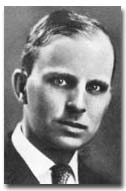Vous pouvez contribuer simplement à Wikibéral. Pour cela, demandez un compte à adminwiki@liberaux.org. N'hésitez pas !
Benjamin Anderson
| Benjamin Anderson | |||||
| Économiste | |||||
|---|---|---|---|---|---|
| Dates | 1886-1949 | ||||

| |||||
| Tendance | École autrichienne | ||||
| Nationalité | |||||
| Articles internes | Autres articles sur Benjamin Anderson | ||||
| Citation | |||||
| Interwikis sur Benjamin Anderson | |||||
Benjamin McAlester Anderson Jr , né le 1er mai 1886 à Columbia dans le Missouri, et décédé le 19 janvier 1949, est un économiste américain, influencé par l'école autrichienne d'économie, alors qu'aucun économiste autrichien n'était encore sur le sol américain. Il fut un défenseur des mécanismes de marché et présenta les causes économiques de la Grande Dépression du point de vue de l'économie de marché.
Il étudie à l'université du Missouri à Columbia à partir de 1902 et y obtient son premier diplôme (A. b) en 1906. Il est nommé Professeur de politique économique et de sociologie au Collège Missouri Valley à Marshall en 1906. Il obtient son diplôme A. M en 1910 à l'université de l'Illinois et son doctorat (PhD.) à l'université de Columbia en 1911. Sa thèse est publiée la même année ; elle s'intitule Social Value: A Study in Economic Theory, Critical and Constructive.
Il enseigne à la faculté de l'université de Columbia durant 2 ans puis à celle d'Harvard pendant 5 années.
Publications
- 1911, Social Value, New York : Houghton Mifflin
- 1915, The Concept of Value Further Considered, The Quarterly Journal of Economics, Vol. 29, n°4, Aug., pp674-708
- 1916, Tendencies in Economic Theory-Discussion. American Economic Review (mars) 168-69 (s)
- 1917, The Value of Money. New York: Macmillan
- Nouvelle édition en 1926
- 1918, Value and Price Theory in Relation to Price-Fixing and War Finance. American Economic Review (mars) 239-56, (s)
- 1919,
- a. The Benefits of Price Readjustment. Economic World, Dec. 28, 1918. American Economic Review (mars) 192
- b. Effects of the War on Money, Credit and Banking in France and the United States. Carnegie Endowment for International Peace. Preliminary Economic Studies of the War, No. 15. (New York) Oxford University Press.
- 1922, "Capitalism versus Socialism in the Light of the Present World Economic and Financial Situation", Chase Economic Bulletin, Vol 2, n°3, pp3-12
- 1924, Cheap Money, Gold, and the Federal Reserve Bank, Chase Economic Bulletin, Août
- 1925, The Gold Standard versus 'A Managed Currency, Chase Economic Bulletin, Vol 5, no. 1, 23 mars
- Traduction en espagnol en 2004, «Moneda administrada frente a Patrón oro», Procesos de Mercado, n° 1, vol. I, Primavera, pp273-303
- 1940, Governmental Economic Planning, American Economic Review, Vol 30, n°1, mars
- 1945, "The Road Back to Full Employment", In : Paul T. Homan et Fritz Machlup, dir., "Financing American Prosperity : A Symposium of Economists", New York: Twentieth Century Fund, pp9–70
- 1949, "Economics and the Public Welfare : A Financial and Economic History of the United States, 1914-1946", New York: D. Van Nostrand comany inc."
- Nouvelle édition en 1979, Economics and the Public Welfare, Indianapolis, Ind. : Liberty Fund
- Chapître 60, "Digression on Keynes", repris en 1960, In : Henry Hazlitt, dir., "The Critics of Keynesian Economics", Princeton, N.J.: Van Nostrand, pp185–206
Littérature secondaire
- 1920, C. A. Phillips, Commentaire sur le livre de Benjamin M. Anderson, "Effects of the War on Money, Credit and Banking in France and the United States,”, American Economic Review (mars) 137-40
- 1965, Martin Anderson, commentaire du livre de Benjamin M. Anderson, "Economics and the Public Welfare", The Objectivist Newsletter, Vol 4, n°5, May
- 1997, Richard M. Ebeling, Monetary Central Planning and the State, Part IV : Benjamin Anderson and the False Goal of Price-Level Stabilization, Freedom Daily, avril
- 2005, Jude Blanchette, Anderson, Hazlitt, and the Quantity Theory of Money, Journal of Libertarian Studies, Vol 19, n°1, pp25-36
- 2010, Murray Rothbard, commentaire du livre de Benjamin Anderson, "The Value of Money", In: David Gordon, dir., "Strictly Confidential: The Private Volker Fund. Memos of Murray N. Rothbard", Auburn: Ludwig von Mises Institute, pp301-302 (note envoyée à Ivan R. Bierly du William Volker Fund le 20 janvier 1960)
- 2011, Jack High, "Dr. Anderson and the Austrians : Price formation as a cumulative process", The Review of Austrian Economics, vol 24, n°2, juin, pp199-211
Liens externes
- (en)Who Is Benjamin Anderson?, par Mark Thornton
- (en)
 [pdf]Cheap Money, Gold, and Federal Reserve Bank Policy, Chase Economic Bulletin, Vol. IV, No. 3, August 4, 1924
[pdf]Cheap Money, Gold, and Federal Reserve Bank Policy, Chase Economic Bulletin, Vol. IV, No. 3, August 4, 1924
| Accédez d'un seul coup d’œil au portail des grands auteurs et penseurs du libéralisme. |
| Accédez d'un seul coup d’œil au portail économie. |